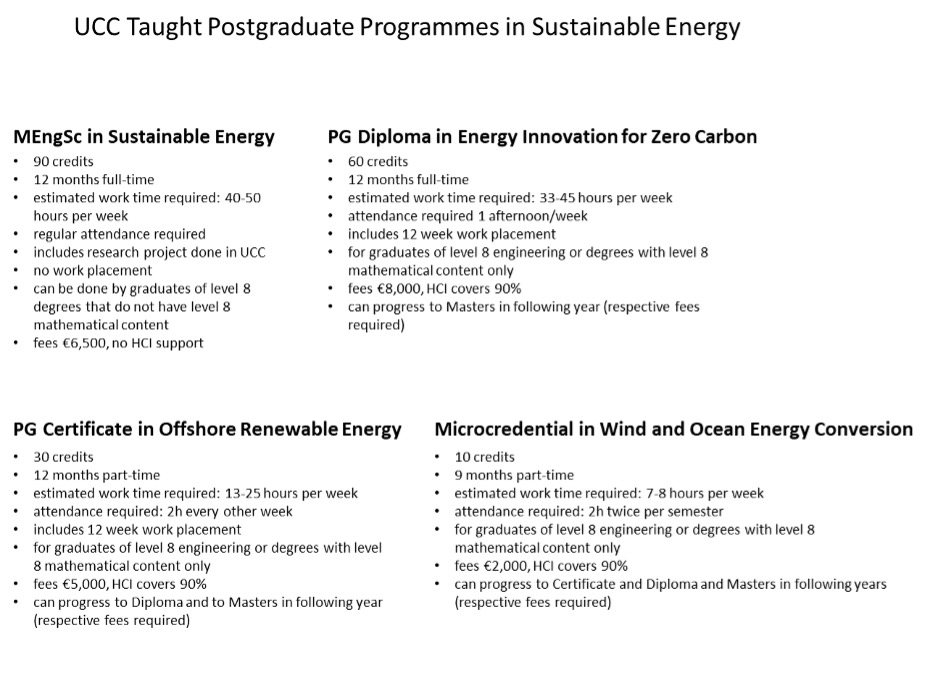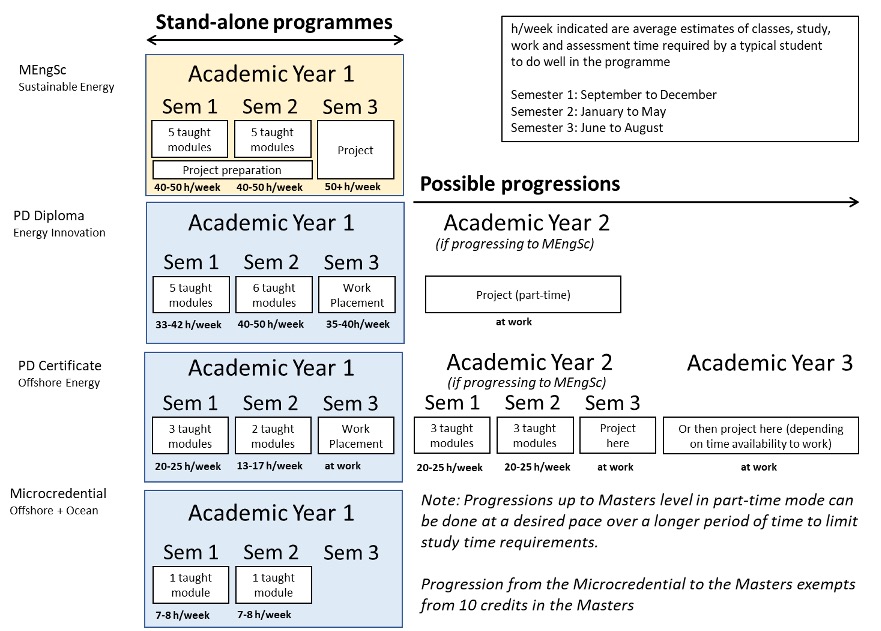| Code | PDIZC |
|---|---|
| Duration | 12 Months |
| Teaching Mode | Full-time |
| Qualifications | PG Dip |
| NFQ Level | Level 9 |
| EU Fees | Free or 90% funded. See Fees and Costs for full details. |
| Closing Date | Rolling deadline. Open until all places have been filled. Early application is advised. |
| Credits | 60 |
| Start Date | 9 September 2024 |
Course Outline

The PG Diploma in Energy Innovation for Zero Carbon at UCC was designed to provide the energy engineering knowledge base required for engineers and engineering practitioners (non-engineers undertaking engineering roles) to switch to this area of growing employment opportunities.
Our Energy Innovation for Zero Carbon programme makes a vital contribution to the energy sector, as Ireland fulfills its international commitments for climate change, and addresses the energy production revolution that is required.
Designed by the College of Science, Engineering and Food Science, in collaboration with industry, we designed the Energy Innovation for Zero Carbon diploma to target individuals who would reskill or upskill towards employment in the energy sectors including:
- local and national planning authorities;
- design engineering and engineering supply companies providing services to the major energy producers;
- the major energy producers.
The diploma combines theory and practice with an enterprise and application angle of cutting-edge technology in renewable energy and carbon neutrality.
Modules
The Postgraduate Diploma in Energy Innovation for Zero Carbon comprises 60 credits:
- MG6901 Developing an Entrepreneurial Mindshift (5 credits)
- NE6201 Wind Energy (5 credits)
- NE6202 Energy Innovation (5 credits)
- NE6204 Photovoltaic Systems (5 credits)
- NE6205 Data Analysis for Energy Engineering Projects (5 credits)
- NE6211 Offshore Wind Energy (5 credits)
- NE6212 Clean Energy Futures (5 credits)
- NE6213 Transportation and Energy (5 credits)
- NE6214 Architectural Design for Renewable Energy Projects (5 credits)
- NE6215 Progressing Towards a Sustainable Industry (5 credits)
- NE6216 Sustainability, Bioenergy and Circular Economy Systems (5 credits)
- NE6221 Work Based Integrated Learning (5 credits)
MEngSc Sustainable Energy
Graduates of the Postgraduate Diploma in Energy Innovation for Zero Carbon, who have passed all modules within the PG Diploma, and have received an aggregate mark of 50%, will be eligible to progress to the MEngSc in Sustainable Energy. Eligible graduates will be contacted by the course director to confirm eligibility, and can then apply for the MEngSc Sustainable Energy via UCCApply.
The MEngSc will not be funded as part of the HCI Pillar 1 initiative and applicants will be required to self-fund this Master’s (MEngSc) degree. The cost for the 30-credit MEngSc component is €3,000.
Course Practicalities
The programme is composed of teaching modules in Semesters 1 and 2 and a 12-week placement in Semester 3:
- Semester 1: 5 teaching modules (September to December)
- Semester 2: 6 teaching modules (January to May)
- Semester 3: 12-week placement in a relevant engineering organisation or research institute for an immersive learning experience in the sector (June to August)
Each teaching module is designed to correspond to 100-125 hours of student work (including class time, study, assignments, and assessments) spread over 15 weeks.
While we encourage our students to attend in person on campus, classes are recorded with suitable software for blended learning, to provide flexibility to the students of this programme.
During the 12 weeks in each Semester, you will also have a 2-hour tutorial for general discussions and interaction with instructors and 3-hour workshops in one module in each Semester, requiring your attendance on one afternoon per week.
At the end of each 12-week period, there is 1 open week for study and 2 for exams. All modules have elements of continuous assessment, with 5 having only continuous assessment and no written exam. Exams are scheduled for invigilated in-room attendance.
Why Choose This Course
At UCC we are uniquely placed to cultivate your interest in the renewable energy sector, both in terms of facilities and world-class researchers/instructors. In addition, UCC houses the main premises of MaREI, the inter-institutional Marine and Renewable Energy Institute, which is a world-class facility supported by Science Foundation Ireland.
You will be taught by experts that are among the top scientists in Ireland in Engineering and Technology, with international recognition in areas such as marine energy, wind energy, biogas production, decarbonation, and the circular economy.
Renewable energy companies in Ireland are entering a major growth phase, as many significant investments materialise. Virtually every industrial company in Ireland is also exploring decarbonation and environmentally friendly energy solutions, including the construction industry, down to the level of individual households.
The job opportunities for engineers with qualifications in renewable energy systems and zero carbon strategies are set to continue growing as Ireland meets its international targets for climate impact mitigation.
Placement or Study Abroad Information
During Semesters 1 and 2 you will be placed in an engineering organisation, or research institute, for the energy engineering work immersive learning module that takes place over 12 weeks in Summer (June to August).
Requirements
Applicants must have:
- a Second Class Honours Grade 2 (or equivalent) in a primary honours degree (NFQ Level 8) in any discipline of Engineering OR
- a Second Class Honours Grade 2 (or equivalent) in a primary honours degree (NFQ Level 8) in areas of science that required having completed level 8 mathematical subjects deemed equivalent to those of engineering (e.g. Physics, Mathematical Sciences, some Computing Science degrees), pending assessment by Programme Director OR
- a pass in any accredited level 8 Engineering degree followed by professional experience deemed of sufficient added value, pending assessment by the Programme Director.
Under Recognition of Prior Learning (RPL) applicants who do not meet the above academic entry requirements may be considered for admission and will be assessed on a number of factors including:
- Academic Achievement
- Prior Work Experience
- Personal Statement
All applicants whose first language is not English must provide evidence of English language proficiency. See our English language proficiency requirements.
Fees and Costs
Places will be subsidised under the Human Capital Initiative (HCI) Pillar 1 as follows:
- Standard EU Fee: €8,250
- 90% Subsidised Fee: €825
- 100% Subsidised Fee: No course fee is payable by the applicant.
See What will it cost? on the HCI webpage for more information.
How To Apply
Applications must be made on Springboard+.
- If you already have a Springboard+ account, please apply here.
- If you are new to Springboard+, please create an account here to apply
- When you log into your existing account or register for a new account, go to the search courses tab and search for the course you are interested in applying for. Further instructions can be found in the 'How to Apply' section of the Springboard+ webpage.
Applicants are advised to apply early as high demand is anticipated and places are limited. Applications cannot be assessed until all supporting documentation has been received.
Documentation that you will need for your application:
1. Applicants who meet the Academic Entry Requirements will need:
- Copies of transcripts from all previous relevant educational qualifications. A parchment may also be required in some instances
- A Personal/Motivation Statement: In 500 words or less, please state why you wish to study this programme
- An up-to-date CV
Where English is not your first language you are required to submit a copy of a UCC approved English Language Test/Exam.
2. Applicants who apply under Recognition of Prior Learning (RPL), will need:
- Copies of transcripts from all previous relevant educational qualifications. A parchment may also be required in some instances
- Personal / Motivation Statement - In 500 words or less, please state:
- Why you wish to study this programme
- How your experience, professional and educational, equips you for admission to the course despite not meeting the academic entry requirements
- An up-to-date CV
- References where applicable
Where English is not your first language you are required to submit a copy of a UCC approved English Language Test/Exam.
3. Eligibility for HCI Pillar 1 Funding:
In addition to the above, academic, English language and RPL requirements, all applicants must provide proof of the following in order to qualify for HCI Pillar 1 funding:
- Evidence of living full time in the Republic of Ireland
- Evidence of holding a valid Personal Public Service Number (PPSN)
- Evidence of having lived in the EU/EEA/UK/Switzerland for 3 out of the past 5 years
- Evidence of meeting the nationality/visa requirement
- Evidence of meeting one of the following employment statuses:
- Employed
- Unemployed and in receipt of an eligible Department of Social Protection (DSP) payment for 9 out of the past 12 months
- Recent graduate (2023 or 2024)
- Returner
- Self-employed
- Formerly self-employed
The above funding eligibility documentation will be required after acceptance of a provisional offer, and not earlier than 6 weeks prior to course commencement. For more detailed information on what constitutes acceptable evidence please visit the Springboard+ website.


